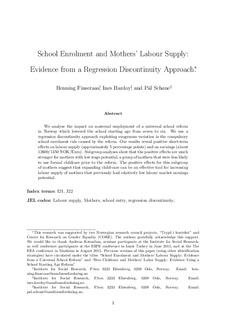School enrolment and mothers’ labor supply: evidence from a regression discontinuity approach
Peer reviewed, Journal article
Accepted version
Permanent lenke
http://hdl.handle.net/11250/2562339Utgivelsesdato
2016Metadata
Vis full innførselSamlinger
- Publikasjoner fra CRIStin [709]
- Tidsskriftpublikasjon [386]
Sammendrag
We analyze the impact on maternal employment of a universal school reform in Norway which lowered the school starting age from seven to six. We use a regression discontinuity approach exploiting exogenous variation in the compulsory school enrollment rule caused by the reform. Our results reveal positive short-term effects on labor supply (approximately five percentage points) and on earnings (about 12600/1350 NOK/Euro). Subgroup analyses show that the positive effects are much stronger for mothers with low wage potential, a group of mothers that were less likely to use formal childcare prior to the reform. The positive effects for this subgroup of mothers suggest that expanding child-care can be an effective tool for increasing labor supply of mothers who previously had relatively low labor market earnings potential. School enrolment and mothers’ labor supply: evidence from a regression discontinuity approach
